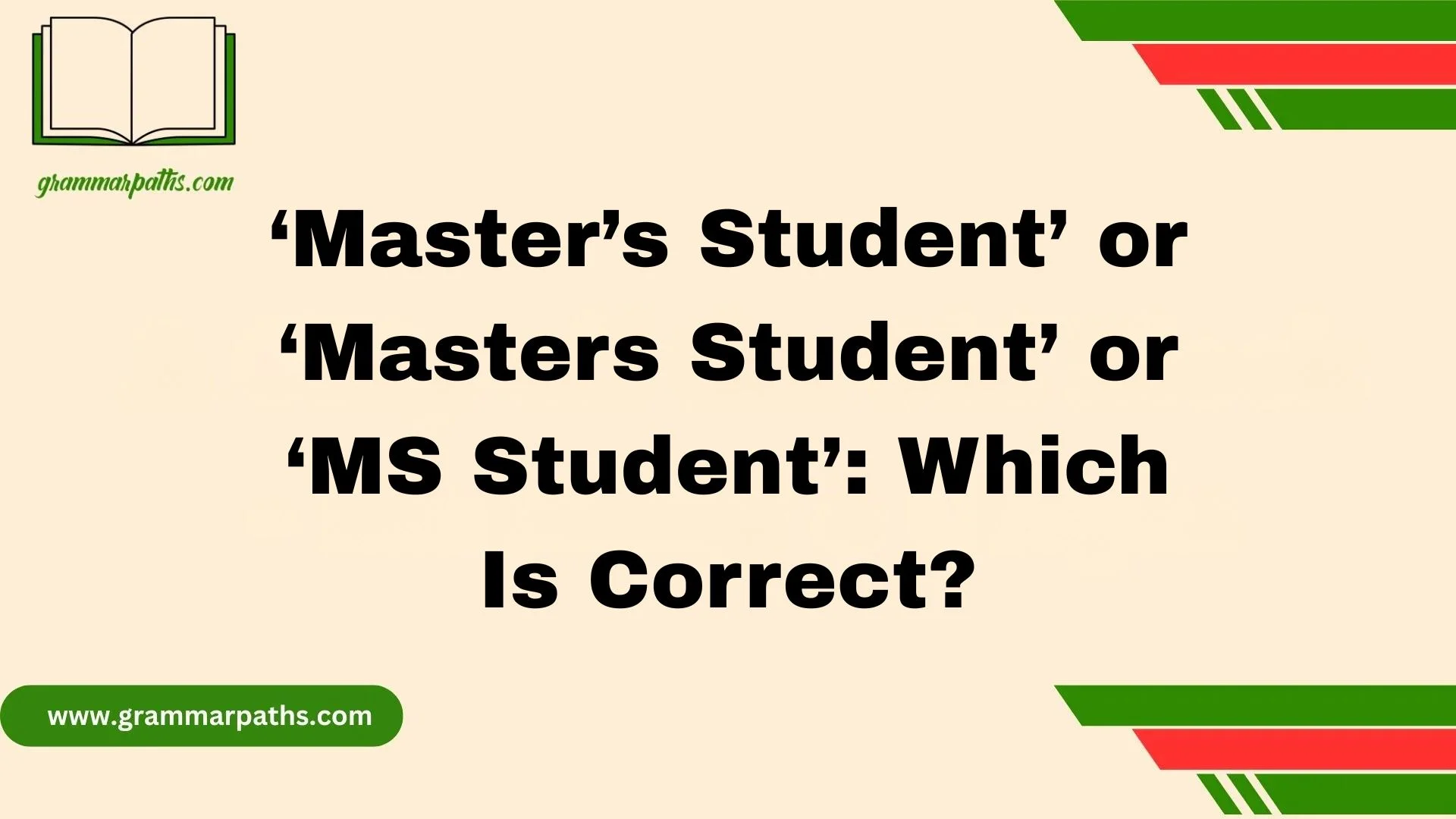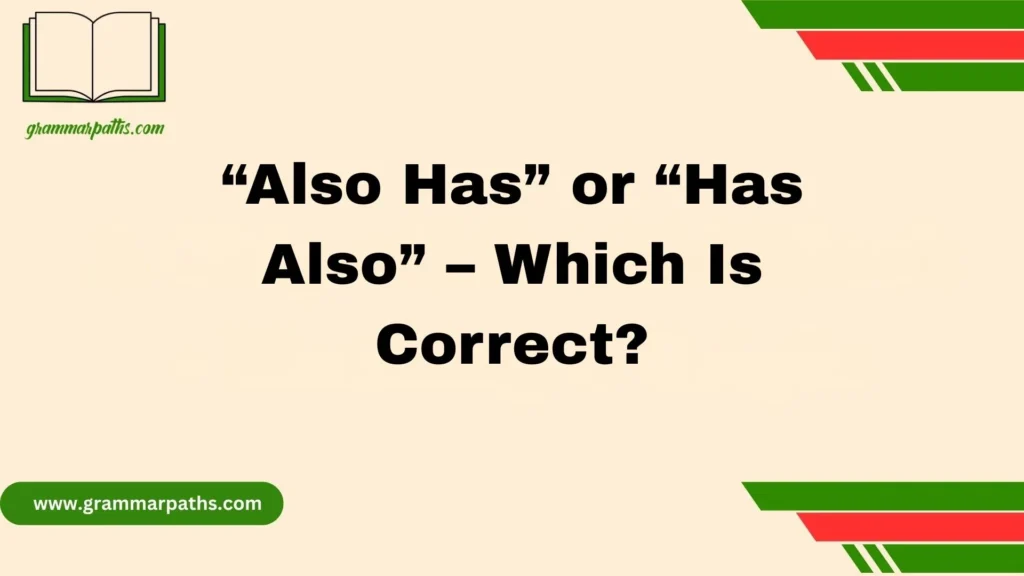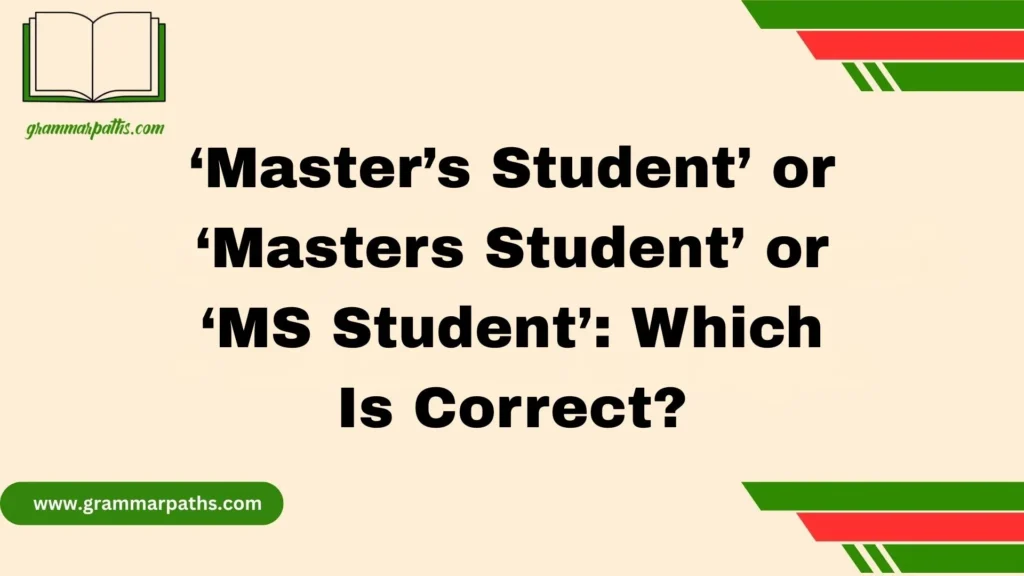When I first started my postgraduate study, I remember the confusion around how to write the title master’s student. Some people dropped the apostrophe, while others added it in the wrong spot, turning it into Masters student or even Masters’ student. This small punctuation mark might seem simple, but it carries meaning and affects the correctness of your academic writing. The apostrophe use shows possessive form, meaning the student belongs to or is part of the Master’s program. In English, that tiny mark defines whether something is a possessive noun or a plural form. A master’s student is someone enrolled in a degree course offered by a university or institution, not someone who owns multiple masters.
From my own academic experience, I’ve seen this usage error appear often in papers and courses where grammar, spelling, and formality matter most. The wrong form—like Masters student—changes the meaning and doesn’t fit the usage rule of English grammar. The correct term must reflect clarity, style, and context, especially in academic or higher education settings. Every sentence in academic writing depends on terminology, distinction, and language precision. So, using the correct form helps maintain the formality and education standards expected in a university environment. It also prevents mix-ups between noun form and possessive form, keeping your writing neat, clear, and professional—something every person in higher education aims for.
The Grammar Behind It: The Power of the Apostrophe
The heart of this debate lies in one grammatical rule—the possessive form. The word master’s includes an apostrophe because it literally means “of a master.”
Let’s unpack that.
When you say master’s degree, you’re describing a degree belonging to or associated with a master. It’s not plural—it’s possessive. The same rule applies to bachelor’s degree and doctor’s degree.
Here’s a simple grammar refresher:
| Form | Meaning | Example |
| Master’s Degree | Possessive – the degree of a master | “I’m pursuing a master’s degree in physics.” |
| Masters Degree | Incorrect – plural noun without possession | ❌ “I’m doing my masters degree.” |
| MS Degree | Abbreviation – stands for Master of Science | “He earned an MS degree in computer science.” |
An easy way to remember:
If it shows ownership or association, use an apostrophe.
That single punctuation mark changes how professional your writing appears. Recruiters, professors, and editors notice these details instantly.
‘Master’s Student’ vs. ‘Masters Student’: The Real Difference
Grammatically speaking, “Master’s Student” is the correct and accepted form.
It means “a student who is pursuing a master’s degree.”
The word master’s is possessive, showing that the student belongs to or is associated with the master’s program.
Why “Masters Student” Is Wrong
“Masters Student” uses masters as a plural noun, suggesting there are multiple masters owning the same student. Grammatically, that makes no sense. It’s like saying teachers student instead of teacher’s student.
Yet, you’ll often see “Masters Student” online. Why? Because informal writing on social media, casual emails, or non-native English use tends to drop apostrophes. However, in formal writing—résumés, applications, academic papers, and professional communication—“Master’s Student” is the standard.
University Example
Let’s look at real usage from top universities:
| University | Official Phrase Used |
| Harvard University | “Master’s student in Education Policy and Management” |
| Stanford University | “Master’s student in Computer Science” |
| University of Michigan | “Prospective master’s student” |
| UC Berkeley | “Master’s degree programs for graduate students” |
Every institution uses “Master’s Student”—never “Masters Student.”
That alone confirms which is academically correct.
Understanding ‘MS Student’: Academic Shorthand Explained
In academic settings, “MS Student” is often used as a shorthand form of “Master of Science Student.” It’s grammatically acceptable, especially in contexts where brevity or technical language is preferred—like email signatures, lab reports, or professional directories.
What “MS” Stands For
- MS = Master of Science
- MA = Master of Arts
- MFA = Master of Fine Arts
- MBA = Master of Business Administration
The abbreviation represents the type of master’s program rather than the grammatical structure.
| Abbreviation | Full Form | Typical Field |
| MS | Master of Science | STEM (Engineering, Biology, Computer Science) |
| MA | Master of Arts | Humanities, Education, Social Sciences |
| MBA | Master of Business Administration | Business, Finance, Management |
So, while Master’s Student is the grammatically correct term, MS Student is a practical, field-specific variation—mainly used in STEM disciplines or research-driven environments.
Example Usage:
- “I’m an MS student working on renewable energy systems.”
- “She’s an MA student focusing on 19th-century American literature.”
The Rule of Possession in Academic Titles
Academic titles often follow the possessive structure to indicate ownership or association.
For example:
- Bachelor’s degree → degree belonging to a bachelor
- Master’s degree → degree belonging to a master
- Doctor’s degree → degree belonging to a doctor
This linguistic form dates back to Medieval Latin, where degree titles used the genitive (possessive) case to show ownership or relation.
Over time, English retained this form as part of academic tradition. So when we say “Master’s degree,” we’re preserving that historic grammatical structure.
Rule Summary:
When the title refers to the qualification of a person, use the possessive form (master’s, bachelor’s).
When it refers to the field or title of study, use the non-possessive form (Master of Science, Bachelor of Arts).
Examples:
- “She earned her master’s degree last year.”
- “She holds a Master of Science in Environmental Engineering.”
‘Master’s Student’ vs. ‘Master’s Candidate’: The Subtle Difference
You may have noticed people referring to themselves as either a Master’s Student or a Master’s Candidate. They sound similar, but they mean slightly different things.
| Term | Stage of Study | Meaning |
| Master’s Student | Early to mid-stage | Currently enrolled and completing coursework |
| Master’s Candidate | Advanced stage | Has completed coursework and is working on thesis or final project |
Example:
“As a Master’s Candidate in Psychology, I’m conducting research on behavioral therapy outcomes.”
So, you can call yourself a Master’s Student when you’re taking classes, and a Master’s Candidate once you’ve advanced to the thesis or research stage.
This distinction is particularly important when describing yourself in:
- Résumés or academic bios
- University directories
- Scholarship or grant applications
Using the correct term signals professional awareness and academic maturity.
Capitalization and Formal Writing Standards
Capitalization rules depend on whether you’re naming a specific degree title or referring to it generally.
General references (no capitalization):
- “She’s pursuing a master’s degree in sociology.”
- “He completed his bachelor’s degree in physics.”
Specific degree titles (capitalize):
- “She earned a Master of Science in Sociology.”
- “He holds a Bachelor of Arts in Physics.”
Style Guide Comparison
| Style Guide | Preferred Form | Example |
| APA (7th ed.) | master’s degree (lowercase) | “I earned my master’s degree in psychology.” |
| MLA (9th ed.) | Master of Science (capitalized when formal title) | “She holds a Master of Science in biology.” |
| Chicago Manual of Style | master’s degree (lowercase generic) | “He finished his master’s degree at Yale.” |
When in doubt:
Capitalize formal titles, lowercase general mentions.
Common Mistakes and Misconceptions
Even native English speakers mix up degree terminology. Here are the most frequent errors—and how to fix them.
Mistake 1: Dropping the Apostrophe
- “Masters Student in Finance”
- “Master’s Student in Finance”
Mistake 2: Capitalizing Everything
- “He Earned His Master’s Degree In Computer Science.”
- “He earned his master’s degree in computer science.”
Mistake 3: Mixing Abbreviations and Full Forms
- “She is a Master’s MS Student.”
- “She is an MS Student.” or “She is a Master’s Student.”
Mistake 4: Using ‘Master Degree’
- “Master Degree”
- “Master’s Degree”
To self-proof your writing, use this quick checklist:
- Does “master’s” have an apostrophe?
- Am I capitalizing only proper names or formal degree titles?
- Am I consistent in abbreviation usage?
These details matter. They project confidence and linguistic accuracy—traits every professional needs
Practical Usage: How to Use Each Term in Real Sentences
Context determines which version of the phrase fits best. Let’s look at proper usage examples.
| Context | Correct Usage | Incorrect Usage |
| Resume | “Master’s Student in Computer Science, University of Illinois” | “Masters Student in Computer Science” |
| Email Signature | “John Doe, MS Student, Department of Chemistry” | “John Doe, Masters Student” |
| LinkedIn Profile | “Master’s Student in Data Analytics | Seeking Research Opportunities” |
| Academic Paper | “The study was conducted by a master’s student at Stanford.” | “The study was conducted by a masters student.” |
Beyond Grammar: Why Correct Usage Reflects Professionalism
Language precision isn’t just about grammar—it’s about credibility.
Every email, cover letter, or research paper you write represents your attention to detail.
In academic and professional environments, people often judge competence based on small cues. A recruiter or professor may subconsciously associate “Masters Student” with carelessness.
Case Study:
When a graduate applicant changed their CV from “Masters Student in Biostatistics” to “Master’s Student in Biostatistics,” they received feedback from a university advisor who said:
“Small details like this show professionalism and academic awareness.”
That’s the power of language. It communicates respect for standards and traditions.
So, using the correct term isn’t just pedantic—it’s a sign of polish.
Quick Reference: Common Master’s Degree Abbreviations
Here’s a guide to the most frequently used master’s degree abbreviations in U.S. academia:
| Abbreviation | Full Degree Title | Common Field |
| MS | Master of Science | Engineering, Physics, Computer Science |
| MA | Master of Arts | Literature, History, Psychology |
| MBA | Master of Business Administration | Management, Finance |
| MFA | Master of Fine Arts | Creative Writing, Film, Design |
| MPH | Master of Public Health | Public Health, Epidemiology |
| MEd | Master of Education | Teaching, Curriculum Design |
| LLM | Master of Laws | Law, Legal Studies |
| MEng | Master of Engineering | Civil, Mechanical, Electrical Engineering |
| MPA | Master of Public Administration | Public Policy, Governance |
When writing about your degree:
- Use the full title in formal documents.
- Use the abbreviation in concise or technical contexts.
Example:
“She completed her Master of Public Health (MPH) at Johns Hopkins University.”
Summary: The Takeaway
To recap the key points:
- “Master’s Student” is grammatically correct and professionally accepted.
- “Masters Student” is incorrect—missing the possessive apostrophe.
- “MS Student” is acceptable shorthand, mainly for STEM fields.
- Use the possessive form when referring to a qualification (master’s degree).
- Capitalize degree names only when using full formal titles (Master of Science).
- Always proofread academic and professional materials for correct form.
Rule to remember: If it shows ownership—use the apostrophe.
Conclusion
Understanding whether to write master’s student, Masters student, or Masters’ student might look like a small issue, but in academic writing, it’s a sign of precision and professionalism. The correct form is master’s student, because it uses the possessive form to show that the student is part of a Master’s program. The other versions—Masters student and Masters’ student—are wrong forms, often caused by confusion over punctuation and grammar. Using the correctness in your language helps maintain clarity, formality, and strong style in academic or higher education contexts. It’s a simple yet powerful way to communicate respect for education and terminology while following standard usage rules.
FAQs
1. Why is “master’s student” correct?
Because it uses the possessive noun form, showing the student belongs to the Master’s program, not multiple masters.
2. Is “Masters student” acceptable in any context?
No, it’s considered the wrong form in formal academic writing. Always include the apostrophe in master’s student.
3. What about “MS student”?
You can use MS student in informal writing or when referring to a degree abbreviation, but in formal academic contexts, master’s student is preferred.
4. Why does the apostrophe matter?
The apostrophe use changes the meaning of the term—without it, you’re talking about multiple masters, not the program itself.
5. How can I avoid this grammar mistake?
Remember, if you’re describing someone enrolled in a Master’s program, use master’s student. Proofread your sentence for grammar, spelling, and punctuation mark accuracy before submitting your paper.

Mia Rose is the passionate writer and founder of GrammarPaths.com, a resource dedicated to helping learners master English grammar, idioms, and writing skills with ease. With a deep love for language and years of experience in teaching and content creation, Mia simplifies complex grammar rules into clear, practical guides that readers can instantly apply.












